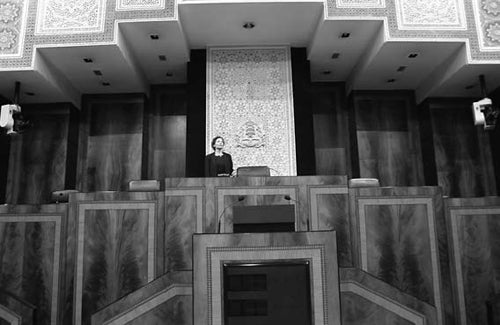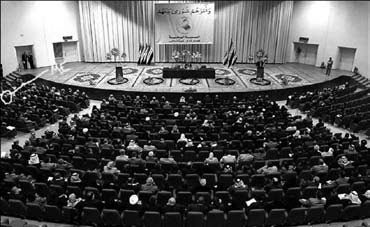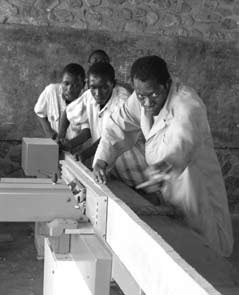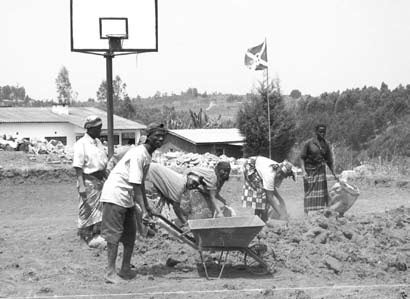Lawrence Medal '07, master of urban planning '91
A&AA honors Julia Demichelis with the Ellis F. Lawrence Medal
Julia Demichelis is the recipient of the 2007 Ellis F. Lawrence Medal, the highest honor awarded by the School of Architecture & Allied Arts. As a community development specialist, Julia has spent over fifteen years transforming war-torn villages into habitable communities through catalyzing at-risk populations to reassume non-violent roles. Demichelis has lived and worked nearly exclusively in complex emergencies and post-conflict societies as an expression of her principles of multi-ethnic/religious co-existence, tolerance, and human diversity. She has often forged solutions amidst so-called "intractable" conflicts. She has directed projects for The American Red Cross, the United States Institute of Peace, World Bank, and non-governmental organizations in Sierra Leone, Burundi, the former Yugoslav States, Malawi, Bulgaria, Iraq, and Senegal.
 The Lawrence Medal is awarded annually to an A&AA distinguished alumnus whose achievements exemplify the Oregon spirit and reflect the integrity, educational philosophy, and excellence demonstrated by Ellis F. Lawrence, the first dean of the School of Architecture and Allied Arts.
The Lawrence Medal is awarded annually to an A&AA distinguished alumnus whose achievements exemplify the Oregon spirit and reflect the integrity, educational philosophy, and excellence demonstrated by Ellis F. Lawrence, the first dean of the School of Architecture and Allied Arts.
After graduating from Georgetown University in 1981, Demichelis entered the Peace Corps and was sent to Ghana, where she evaluated and redesigned a program to improve agricultural development. Her work was so profound that the Peace Corps Association awarded her the 1999 Sargent Shriver Award, the most prestigious award bestowed on a Peace Corps alumnus.
Upon returning from Ghana, Julia came to the University of Oregon for a master of urban planning degree in disaster preparedness and planning from the Department of Planning, Public Policy and Management. She envisioned a career in disaster preparedness in Oregon, but in her last year at UO she received a phone call from the International Red Cross urging her to return to western Africa to initiate community development programs amidst a violent war in Liberia and Cote d'Ivoire. The planning skills she had acquired in Oregon now became important skills in the global arena. She completed her degree and accepted the assignment.
That was 1991. Several wars, human crises and over thirty countries later, Demichelis went to Iraq where she led a team to assist the Iraqi National Assembly to establish itself as the professional institution it remains today amidst an emerging democracy. Now, in Morocco, she provides tools to the parliament to withstand its challenges. Julia recalls, "My life journey through genocides and liberation wars, human trafficking networks and autocratic regimes, has taken me a world away from the county planning office in Oregon that I sought to join."
Through the years Demichelis has successfully adapted her skills to develop programs in complex social, economic, and political contexts: anti-terrorist programs, multi-ethnic reconciliation, military, civil, humanitarian and security operations, community-based HIV/AIDS and anti-corruption programs, pre-bombing campaign mass population movements, NGO/civil society policy in emerging democracies, and parliamentary legislative strengthening.
A&AA Review, Spring 2005
The Peacemaker
Julia Demichelis Facilitates Growth of Democracy in Iraq
Ask Julia Demichelis what she does and she can describe the nature of her work to you in English, French, Serbian, or Albanian. As a disaster preparedness planner, she has planned disaster and development programs for emerging democracies, refugee camps, security operations, municipal reconstruction, child ex-combatant rehabilitation, and anti-terrorism, anti-corruption, and anti-trafficking efforts.
 "UO was my uncontested choice. PPPM's educational approach is well-integrated through a rigorous curriculum with provocative professional thought. This education, in the cohesive student community fostered by PPPM faculty, exceeded my expectations for graduate study. PPPM faculty taught me how to use—and to adapt—planning tools in accordance with the immediate issue at hand."
"UO was my uncontested choice. PPPM's educational approach is well-integrated through a rigorous curriculum with provocative professional thought. This education, in the cohesive student community fostered by PPPM faculty, exceeded my expectations for graduate study. PPPM faculty taught me how to use—and to adapt—planning tools in accordance with the immediate issue at hand."
As of February 2005, Demichelis is the Chief of Party of the State University of New York's Center for International Development, one of five U.S. organizations in the Consortium for Electoral and Political Processes Strengthening in Iraq. She helps parliamentarians and staff to build their parliament in a professional and socio-politically appropriate manner. A USAID/Iraq project, CEPPS trains elections workers, strengthens civil society participation in governance, provides technical assistance in drafting the new constitution, and promotes democratic institutions throughout Iraq.
 Demichelis focused her studies at UO on disaster preparedness planning for earthquakes and other events likely to occur in Oregon. Envisioning a career in service among Oregon communities and institutions, she volunteered with the disaster services unit of the local chapter of the American Red Cross. Then, during her last term at UO, she received a life-changing telephone call. The International Red Cross urged her to return to West Africa, where she had volunteered with the Peace Corps a decade before, to initiate community development programs amidst a violent war in Liberia and Cote d'Ivoire. The planning skills she learned at UO had become a strategic asset in the global arena. On a visit home eleven years and 25 countries later, she finally hauled her old belongings out of storage, giving most to new UO students.
Demichelis focused her studies at UO on disaster preparedness planning for earthquakes and other events likely to occur in Oregon. Envisioning a career in service among Oregon communities and institutions, she volunteered with the disaster services unit of the local chapter of the American Red Cross. Then, during her last term at UO, she received a life-changing telephone call. The International Red Cross urged her to return to West Africa, where she had volunteered with the Peace Corps a decade before, to initiate community development programs amidst a violent war in Liberia and Cote d'Ivoire. The planning skills she learned at UO had become a strategic asset in the global arena. On a visit home eleven years and 25 countries later, she finally hauled her old belongings out of storage, giving most to new UO students.
In recognition of her work as a conflict resolution consultant in Ghana, Demichelis received the Sargent Shriver Award for Distinguished Humanitarian Service from the National Peace Corps Association in 1999. Named for the first Peace Corps director, this award honors an individual Returned Peace Corps Volunteer who makes a sustained and distinguished contribution to humanitarian causes.
Demichelis credits her success to her ability to adapt the pace and scope of planning for each new situation. She learns languages, laws and cultural differences to ensure the effectiveness of externally-driven planning and investment. "If I had failed…I would have returned to Oregon long ago. It is through the successes of my counterparts in post-conflict planning and reconstruction that I gain courage to try to adapt my skills to a new situation. Having said that, I wholeheartedly hope that soon I will retire from this erratic pace and return to Oregon to encourage more Ducks to carry on this fascinating and demanding planning work around the world."

Originally published in the A&AA Review, Spring 2007
